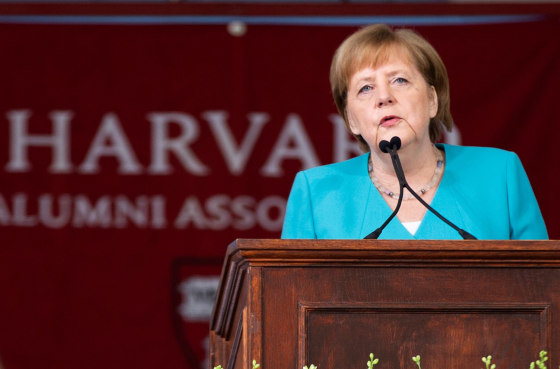

German Chancellor Angela Merkel delivers the keynote speech at Harvard's 368th commencement ceremony at Harvard University in Cambridge, Massachusetts on May 30, 2019. Allison Dinner / AFP - Getty Images
May 30, 2019, 11:04 PM UTC By Carlo AngererCAMBRIDGE, Mass. — German Chancellor Angela Merkel addressed Harvard University's graduates Thursday, using the moment to address topics she's publicly disagreed with President Trump on including trade, the spread of misinformation and walls, while not directly mentioning the president by name.
“More than ever our way of thinking and action have to be multilateral rather than unilateral, global rather than national, outward looking rather than isolationist,” Merkel said. “In short, we have to work together rather than alone.”
Merkel, in office for more than 14 years, shook her head and smiled as she was introduced as the “de facto leader of the European Union” at the open-air stage at Harvard’s Tercentenary Theater.
The crowd cheered and welcomed her with a standing ovation. Merkel, who received an honorary Doctor of Laws degree, began her speech speaking English, telling graduates “today is a day of joy, it’s your day, many congratulations.”
She continued in German reflecting on growing up in Eastern Germany during the Cold War, “the part of my country that was not free and under dictatorship.”
“Every day I had to turn away from freedom at the last minute. I don’t know how often I thought I couldn’t take it anymore, it was so frustrating,” she said.
It was at times a deeply personal speech, but she also used the stage to defend her political values.
“The transatlantic partnership based on values such as democracies and human rights has given us an era of peace that has benefited all sides,” she said. “Protectionism and trade conflicts jeopardize international free trade and therefore the basis of our prosperity.”
The Trump Administration has taken a hard line on trade, putting tariff's on steel and aluminum from the European bloc last year, slapping tariff's on $250 billion in Chinese goods in an attempt to strike a trade agreement with the country and redrafting the North American Free Trade Agreement (NAFTA) as the U.S.-Mexico-Canada Agreement (USMCA).
And even when Merkel gave personal advice to graduates such as not to act on their impulses and stressed the importance of not spreading misinformation, telling graduates to "take the time to stop, be still, pause."
“That requires us not to describe lies as truth and truth as lies,” she added and was cheered on.
The chancellor went on to stress the importance of breaking down walls. “Walls in people’s minds, walls of ignorance and narrow mindedness,” she said. “I would like us to see break down these walls.”
Overall she aimed to spread optimism and stressed to graduates that they can make a difference.
“Anything that seems to be set in stone or inalterable can indeed change,” she said. “In matters both large and small, it holds through that every change begins in the mind.”
Merkel said that the next generation would need to bring about change given the challenges of the next decades such as the power of technology, war and terrorism, forced migration as well as climate change.
“It and the resulting crisis are caused by humans therefore we can and must do everything humanly possible to master this challenge to human kind," she said.
Graduates said they felt inspired by the chancellor's message.
"She's an incredibly powerful leader and an incredibly empowering figure," Chacha Yeng of Toronto said.
Wendy Waters, who graduated with a Master's degree in math for teaching said she felt that Merkel connected with the graduates on a personal level.
“She just has a really positive outlook and I just really appreciated what she had to say and I think it’s something what every single person here need to hear. We do need to work together, we do need to think about our future,” she said.
Carlo AngererCarlo Angerer is a multimedia producer and reporter based in Mainz, Germany.